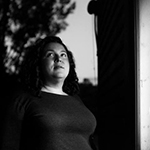The Dinner Party
Things I’m not going to tell you about: her makeup, his hair, the cut of their clothes, her flickering glances, the unconscious movement of his hand and whether it aligns or contrasts with the cant of his shoulder and/or flexion of his jaw. Any music that might be playing. The lighting; the shadows. Anybody’s car. The living room wallpaper. The sofa, its pillows, upholstery. The way the bathroom faucet does or does not drip as a metaphor for something—class maybe, or emotions bursting or stuck. I’m not going to tell you any secrets regarding longings or histories or physical marks. But there is a dog snuffling around in the space between their feet; there is dust between the floorboards that is older than this town—this whole country, in the oh-say-can-you-see sense, anyway. Before they were felled, the trees that turned into the timbers that hold up the roof had roots as deep and wide as the canopies they cast into the sky. Did you know the forest is a mirror? Its duff an axis not unlike the line on the horizon where the sea and the sky collapse, indistinguishable. The dog once ate a mushroom from the duff in the place where the trees-turned-timbers were felled. It told her things far more valuable than whatever’s inside the room I’m not describing. The people in that room don’t gather mushrooms from the ground but from a paper box. The people and their paper-box mushrooms are surprisingly alike: purpose-grown in a sterile substrate to generate economic value in the marketplace. Isolated from the knowings in the dirt by design. Did you know that mushroom spores are one-tenth the width of a human hair, and that they seed not only the earth but the sky? At the heart of every raindrop: a spore. The dog marvels at the magic of it. The people eat their crab-stuffed creminis, oblivious to the missing taste of mycelial interconnection. Later the people will die an animal death. This, after a lifetime of trimming their whiskers and masking their scents, shuffling sheaves of paper made from toppled trees and eating lonely mushrooms born for boxes. No matter how their bodies are returned—buried, burned to ash—the earth will welcome them. Did you know that the end is a mirror of the beginning? The trees draw their nutrients from the rich soil. The network of fungi at their feet, pulsing with unknowable intelligence, calls down the rain under the gibbous moon.

Maria Robinson studied Creative Writing at The Johns Hopkins University and has done graduate work at the Iowa Writers’ Workshop. Her work has appeared in Electric Literature, Wigleaf, Best Microfiction 2023, The Forge, Bellevue Literary Review, and Cream City Review, among others. Find her at mariarobinson.com.

 BACK TO ISSUE
BACK TO ISSUE